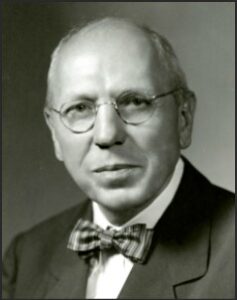The University of Richmond is “canceling” one of its most distinguished graduates, Douglas Southall Freeman (1886 – 1953). Specifically, they are dropping his name from Mitchell-Freeman Hall.
After leaving Richmond University to earn a PhD at Johns Hopkins, Freeman returned to Virginia’s capital where he joined the Richmond Times-Dispatch in 1909 and, in 1915, at the age of 29 became editor of the Richmond News Leader—a position he held for 34 years. During those years he wrote a four-volume biography of Robert E. Lee, a four-volume study of General Lee’s Lieutenants, and finished two volumes of a seven-volume biography of George Washington. He completed four more volumes of the Washington biography after retirement whereas two of his associates finished the seventh volume after his death. The Lee and Washington bios won Pulitzer Prizes and Lee’s Lieutenants put Freeman into a close circle of military friends including Generals George Marshall and Dwight Eisenhower.
If there ever can be a last word on Lee, Washington, and the Confederate Army of Northern Virginia, Freeman’s work has it. His work ethic was legendary. He kept a schedule that allowed him to accomplish a great deal in his two full-time careers as a journalist and historian. He rose at three every morning to drive to his office. Twice daily he walked to a radio station where he gave news broadcasts and analysis. After the second broadcast, he would drive home for lunch and a short nap before working another five or six hours on his current historical project. There could hardly be a better role model of success through self-discipline.
Nonetheless, the University of Richmond is throwing him under the bus because he “was in favor of racial segregation, the eugenics movement, and the poll tax and opposed interracial marriage.” No elaboration on the accusations is readily available from the school or the “Naming Principles Commission” it is hiding behind.
Nonetheless, concerning opposition to interracial marriage it may be said that the vast majority of Americans—white and black—disapproved of it during his lifetime. As late as 1968—fifteen years after his death—75% of whites and 73% of blacks disapproved of interracial marriage. Moreover, his newspaper editorials took a moderate stance on race relations and opposed the political machine of Senator Harry F. Byrd who was one of the South’s most vocal proponents of racial segregation from the 1940s to 1960s.
As for the poll tax, some sources have falsely reported that it applied only to blacks. In truth, it applied to any citizen wanting to vote, white or black. If it was a discriminatory burden, it was a burden segregated by economic class, not race, at a time when many Virginia whites were poor. Moreover, voters were often able to get a political party to pay the $1.50 fee for them if they would pledge to vote for the paying party’s candidate.
As for Freeman’s support of eugenics, I cannot categorically deny it because I can find little information about it. Nonetheless, among the supporters during Freeman’s lifetime were President Theodore Roosevelt, John D. Rockefeller, Jr., Helen Keller, and Alexander Graham Bell. Additionally, few American eugenics supporters took it to the extremes of California. Beginning under the leadership of Attorney General Ulysses Webb who was in office from 1902 to 1937 the doctrine led the state to sterilize thousands of its citizens. The last occurred the year before the 1964 Civil Rights Act.
This column has been republished with permission from Civil War Chat.


Leave a Reply
You must be logged in to post a comment.